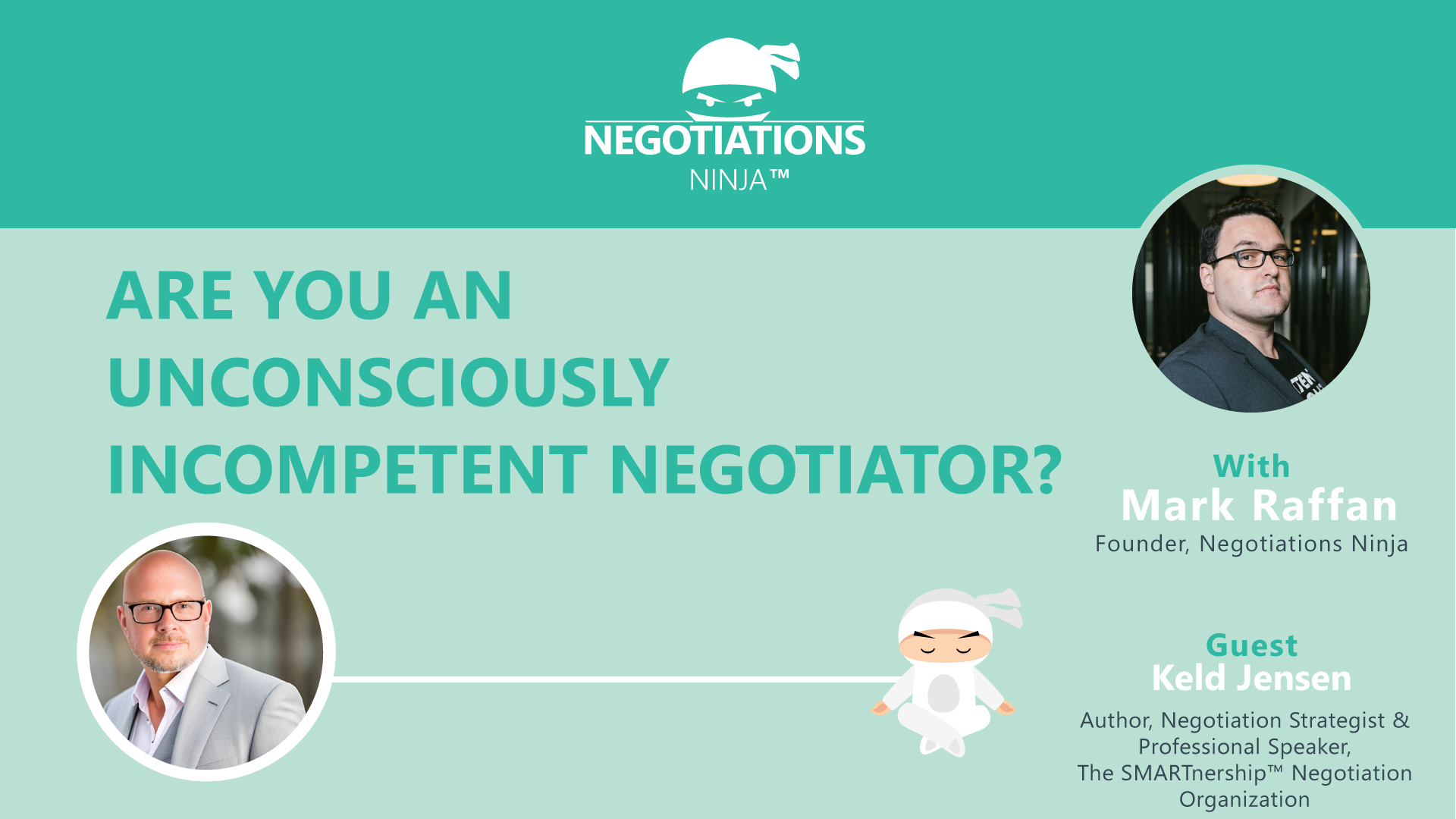Why are most negotiators unconsciously incompetent? Keld lives and breathes negotiation. He’s been negotiating since 1998. Before that, he was the CEO of a tech company. He thought he was a great negotiator but realized he was unconsciously incompetent. It was a terrible realization. What you choose to do when you’re hit with the realization dictates whether or not you’ll become a competent negotiator. Learn more in this intriguing episode of Negotiations Ninja.
Outline of This Episode
- [2:05] Learn more about Keld Jensen
- [3:33] Why most negotiators are unconsciously incompetent
- [8:56] How do you tell if you’re losing a negotiation?
- [13:32] Negotiating how to negotiate
- [19:03] The use of artificial intelligence in negotiation
Why most negotiators are unconsciously incompetent
Anyone reading this would agree that negotiation is crucial. It’s important to the success of any organization. Training is also important. A recent study showed that 55% of contract professionals have never received any negotiation training.
Keld’s friend recently told him that he got trained 18 years ago. Keld wrote his first book 18 years ago. When he recently reread it, he thought it was terrible. He wouldn’t advise anyone to buy it. Why? Because negotiation is constantly changing. The advice, strategies, and tactics used in 1998 are no longer useful today. Your education must continue. We need to continue to read books and listen to experts.
There’s no one “right” approach to negotiation
The field of negotiation is broad. One strategy or tactic can’t be used or applied by everyone. You can’t just read the best-seller and call it good enough. There is no default approach to negotiation. But people believe they’re experts because they’ve read “The” book on negotiation. But one book can’t contain everything you need to know about negotiation.
If you’ve done one deal, you’ve done one deal. Every negotiation will be different from the next. If someone runs into Keld’s house and asks him for help with a hostage negotiation, he would say, “I have no idea what to do.” He’s a commercial negotiator. There’s an incredible difference between the philosophies in a hostage negotiation versus a commercial negotiation.
How do you tell if you’re losing a negotiation?
How do you know if you’re losing a negotiation? Are they answering your questions? You have to ask questions. If a counterpart doesn’t answer your questions, you should know that it isn’t going well for you. If you’re embracing a collaborative mindset but the counterparty is focused on zero-sum, you’re going to lose. They’re not being transparent or sharing information.
That’s why Keld is an advocate for negotiating how to negotiate before the negotiation begins. Why? Because your counterpart may enter the room thinking negotiation is like a game of chess. You may approach the negotiation like playing tennis. You won’t be able to negotiate with each other.
Why not sit down and discuss how to negotiate? If the counterpart rejects that, it’s a sign that they won’t be collaborative and have their own agenda. You’re in a negotiation to improve your bottom line—but there are different ways of doing that.
We need a negotiation strategy. We need to identify if we’re taking a precisional or collaborative approach. Many negotiators stumble into a conference room and accidentally pick a direction. It’s rarely a conscious choice.
You need a plan, and you need a plan B. If a counterparty isn’t playing ball, you have to decide whether or not to continue with the negotiation. Learn more about approaching negotiation with eyes wide open in this episode of Negotiations Ninja.
Resources & People Mentioned
Connect with Keld Jensen
- Keld’s NEW book: Negotiation Essentials
- Keld’s Website
- Connect on LinkedIn
Connect With Mark
- Follow Negotiations Ninja on Twitter: @NegotiationPod
- Connect with Mark on LinkedIn
- Follow Negotiations Ninja on LinkedIn
- Connect on Instagram: @NegotiationPod




